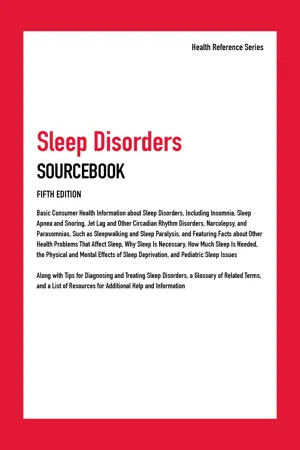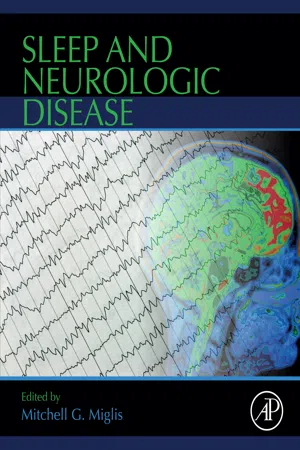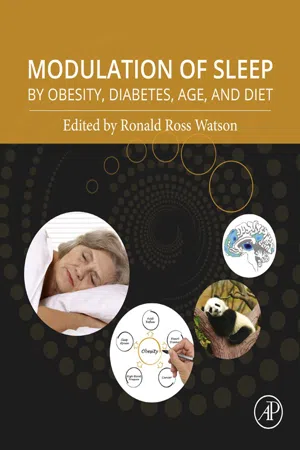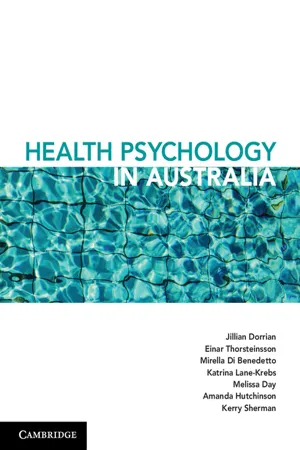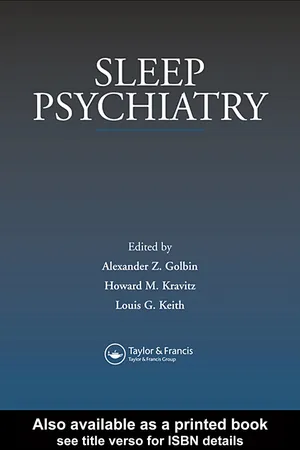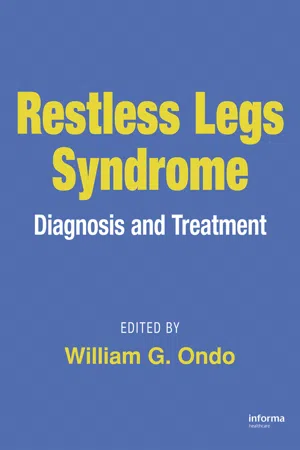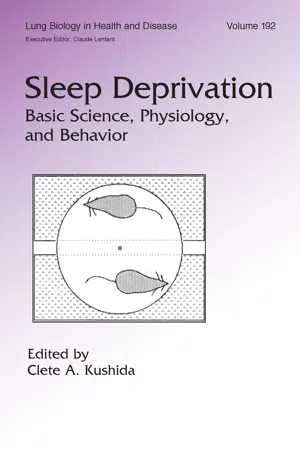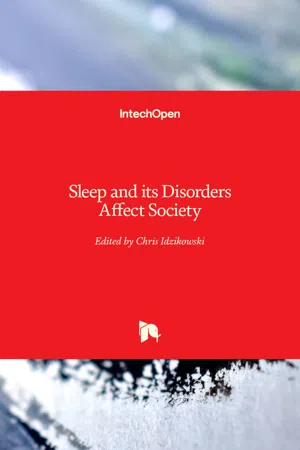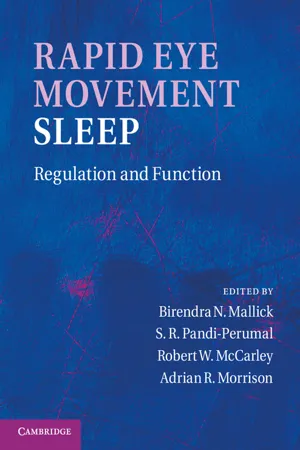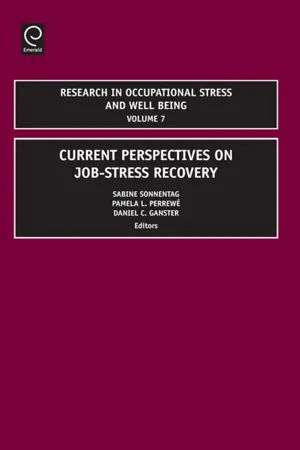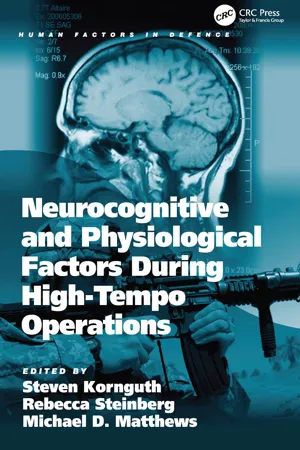Psychology
Sleep Deprivation
Sleep deprivation refers to the condition of not getting enough sleep, which can lead to a range of negative effects on cognitive function, mood, and physical health. Chronic sleep deprivation has been linked to issues such as impaired memory, decreased attention, and increased risk of certain health problems. It is a significant area of study in psychology due to its impact on overall well-being and mental health.
Written by Perlego with AI-assistance
Related key terms
1 of 5
12 Key excerpts on "Sleep Deprivation"
- eBook - PDF
- Angela L. Williams(Author)
- 2019(Publication Date)
- Omnigraphics(Publisher)
Part Two The Causes and Consequences of Sleep Deprivation 81 Chapter 10 Sleep Deprivation and Deficiency What Are Sleep Deprivation and Deficiency? Sleep Deprivation is a condition that occurs if you do not get enough sleep. Sleep deficiency is a broader concept. It occurs if you have one or more of the following: • You do not get enough sleep (Sleep Deprivation). • You sleep at the wrong time of day (that is, you are out of sync with your body’s natural clock). You do not sleep well or get all of the different types of sleep that your body needs. You have a sleep disorder that prevents you from getting enough sleep or causes poor quality sleep. Sleeping is a basic human need, such as eating, drinking, and breathing. As with these other needs, sleeping is a vital part of the foundation for good health and well-being throughout your lifetime. This chapter contains text excerpted from the following sources: Text beginning with the heading “What Are Sleep Deprivation and Deficiency?” is excerpted from “Sleep Deprivation and Deficiency,” National Heart, Lung, and Blood Institute (NHLBI), April 22, 2019; Text beginning with the heading “Habits to Improve Your Sleep is excerpted from Are You Getting Enough Sleep? Centers for Disease Control and Prevention (CDC), March 18, 2019. 82 Sleep Disorders Sourcebook, Fifth Edition Sleep deficiency can lead to physical and mental-health problems, injuries, loss of productivity, and even a greater risk of death. How Much Sleep Is Enough? The amount of sleep you need each day will change over the course of your life. Although sleep needs vary from person to person, the table below shows general recommendations for different age groups. This table reflects the American Academy of Sleep Medicine (AASM) recommendations that the American Academy of Pediatrics (AAP) has endorsed. - eBook - ePub
- Mitchell G. Miglis(Author)
- 2017(Publication Date)
- Academic Press(Publisher)
Chapter 3The Functions of Sleep and the Effects of Sleep Deprivation
E.H. During* , **M. Kawai*** Division of Sleep Medicine, Stanford University, Redwood City, CA, USA** The Stanford Center for Sleep Sciences and Medicine, Redwood City, CA, USAAbstract
Sleep serves many essential physical and behavioral functions. Total acute Sleep Deprivation leads to rapidly progressive multiorgan failure and death in animal models. Chronic mild Sleep Deprivation has been associated with emotional instability, decreased pain tolerance, metabolic disease, immunodeficiency, impaired cognitive performance and memory consolidation. A recent report from the Centers for Disease Control and Prevention estimates that over one third of the US population sleeps less than the amount recommended by experts consensus. In addition, Sleep Deprivation is estimated to cost our society approximately US$43–$56 billion per year. This chapter details some of the physiological and behavioral aspects that perpetuate this state of chronic sleep-deprivation in a productivity-driven society. It also describes sleep-specific mechanisms that may be involved in memory consolidation.Keywords
sleep functions homeostasis deprivation metabolism cognition memory emotions immune system drivingOutlineIntroductionSleep and StressRegulation of AppetiteGH, PRL, TSH, GnRH, and TestosteroneMood, Emotional Stability and Reward CircuitsEmotional MaturationDreamingRegulation of PainCognitive Performance and the Effects of Sleep DeprivationAccidents and Safety in Acute and Chronic Sleep DeprivationMemoryInsight and Creativity, Gist MemoryImmune FunctionConclusionsReferencesIntroduction
As humans, we spend approximately one third of our lives sleeping. Sleep is not only critical for physiological homeostasis and recovery also several essential metabolic, psychological, cognitive and immune functions. Sleep Deprivation is a relative concept because it compares actual with ideal sleep duration, which is not universally agreed upon, and may vary from person to person. Expert consensus from the American Academy of Sleep Medicine has recently estimated that a minimum of 7 h of sleep is needed on average to support optimal health in adults.1 The National Sleep Foundation has also published sleep duration recommendations for each age group.2 According to these recommendations, adults require 7–9 h of sleep, whereas teenagers require 8–10 h, and children ages 6–13 require 9–11 h. Although 7 h may be sufficient for most adults, it may not be sufficient for other age groups, especially younger populations. Despite these recommendations, a recent report from the Centers for Disease Control and Prevention estimates that over one third of the US population sleeps less than 7 h.3 - Ronald Ross Watson(Author)
- 2014(Publication Date)
- Academic Press(Publisher)
Van Dongen, Maislin, Mullington, & Dinges, 2003 ). Because the probability of attentional lapses increases whenever sleep is reduced below an individual’s optimal range, any behavior that occurs during a sleep-restricted state can be considered as higher risk. Naturally, the magnitude of that risk will depend on the severity of the potential consequences from an attentional failure.In summary, high-risk behavior is more likely during periods of prolonged sleep loss because the degradation of simple attention increases the probability of making errors or missing critical information.Lack of Awareness of Deficits
Risk-taking can occur because an individual fails to appreciate the potential hazards associated with their choice or behavior. For example, a person who has consumed several alcoholic beverages may attempt to drive home while intoxicated—an extremely risky activity—simply because the alcohol has affected their ability to judge the severity of their deficits. The behavioral effects of Sleep Deprivation have been frequently compared to those of alcohol intoxication and shown to produce similar levels of psychomotor impairment (Arnedt, Wilde, Munt, & MacLean, 2001 ; Dawson & Reid, 1997 ). In fact, several studies have now shown that the impairment associated with 24 h of total Sleep Deprivation is comparable to a blood alcohol concentration of approximately 0.10, which equals or exceeds the legal limit in all 50 states in the United States (Dawson & Reid, 1997 ; Williamson & Feyer, 2000 ).Sleep Deprivation, however, may actually share more in common with alcohol intoxication than simply an impairment of psychomotor responses. Just as an individual who is legally intoxicated may fail to appreciate the severity of their deficits, some evidence also suggests that sleep-deprived individuals may lack a full awareness of their impairments or level of actual sleepiness. For instance, Van Dongen et al. compared two groups of individuals differing in their objective (i.e., response time) vulnerability to sleep loss during 40 h of total Sleep Deprivation (Van Dongen, Maislin, & Dinges, 2004 ). Participants who had been selected to be more vulnerable to sleep loss showed severe increases in the number of attentional lapses during the 40-h vigil, while those selected to be less vulnerable were relatively stable over the same time period. However, despite the obvious differences in objective performance, these two groups reported their subjective sleepiness to be virtually identical on a 7-point sleepiness scale, suggesting that the worst performers were essentially unaware of the true magnitude of their impairment. In other words, an individual’s judgment of his/her level of sleepiness is not a reliable indicator of actual performance capacity. On the other hand, some evidence suggests that sleep-deprived individuals are reasonably able to make accurate judgments about their level of performance impairment for various cognitive capabilities (Baranski, 2007 ; Baranski, Pigeau, & Angus, 1994- eBook - PDF
- Jill Dorrian, Einar Thorsteinsson, Mirella Di Benedetto, Katrina Lane-Krebs, Melissa Day, Amanda Hutchinson, Kerry Sherman(Authors)
- 2017(Publication Date)
- Cambridge University Press(Publisher)
127 6 Sleep, sleep loss, safety and health 127 prevention/control (AIHW, 2011). The risk factors for these health priorities are a complex interaction of physical, behavioural and social factors. Key behavioural risk factors that are an important research focus include poor diet, lack of exercise, smoking and excessive alcohol consumption (Amoroso et al., 2009 ; Bennett, 1995 ; Crouch, Wilson & Newbury, 2011 ; Flicker, Lautenschlager & Almeida, 2006 ). At the same time, we have an increasing body of evidence highlighting the negative impact of sleep loss for performance, safety and health (Bohle et al., 2004 ; Caruso, 2014 ; Folkard & Tucker, 2003 ; Rajaratnam & Arendt, 2001 ). However, sleep is frequently left out of discussions about healthcare. This chapter will: discuss sleep and circadian rhythms and how scientists define and understand sleep based on measurement of our body and brain; discuss the consequences of sleep loss for performance, safety and health, focusing on one example group who is very frequently sleep deprived (shiftworkers); and describe simple recommendations for maximising sleep. Understanding sleep and circadian rhythms What is sleep? Sleep is a reversible behavioral state of perceptual disengagement from and unresponsiveness to the environment. (Carskadon & Dement, 2011 , p. 6) The above definition of sleep captures a major property of sleep: a change in consciousness or environmental awareness. Sleep is also typically associated with physical inactivity, closed eyes and reclined posture (Carskadon & Dement, 2011 ). Why do we sleep? Interestingly, this is something about which researchers find it difficult to agree (Kavanau, 2005 ; Krueger, Obál & Fang, 1999 ; Nicolau et al., 2000 ). A large body of research has focused on understanding sleep from a physiological perspective, measuring what happens in our brains and bodies while we sleep to identify patterns. These patterns are used to define sleep and classify it into a series of stages. - eBook - PDF
Infrared Spectroscopy
Life and Biomedical Sciences
- Theophile Theophanides(Author)
- 2012(Publication Date)
- IntechOpen(Publisher)
A recent study in rats suggested that sleep loss often elicits periods of local sleep, in which some neurons often go ‘offline’ briefly in one cortical area but not in another during long periods of wakefulness (Vyazovskiy, 2011). Several basic cognitive functions are vulnerable to sleep loss in humans. These include simple response speed (Buysse et al., 2005; Frey et al., 2004; Koslowsky & Babkoff, 1992), psychomotor vigilance (Blatter et al., 2005; Doran et al., 2001; Drake et al., 2001; Van Dongen et al., 2003), mental arithmetic (Frey et al., 2004; Stenuit & Kerkhofs, 2008; Van Dongen et al., 2003;), response inhibition (Drummond et al., 2006; Stenuit & Kerkhofs, 2008), problem solving (Killgore et al., 2008; Nilsson et al., 2005), and short-time perception (Soshi et al., 2010). However, the Effects of Sleep Debt on Cognitive Performance and Prefrontal Activity in Humans 27 performance of executive functions, one of the higher cognitive functions that includes divided attention (Drake et al., 2001; Frey et al., 2004; Lim & Dings, 2010; Stenuit & Kerkhofs, 2008) and working memory (Bartel et al., 2004; Binks et al., 1999; Choo et al., 2005; Frey et al., 2004; Lim & Dings, 2010; Tucker et al., 2010; Wimmer et al., 1992) varies among studies; some report a significant effect of sleep loss (Bartel et al., 2004; Choo et al., 2005; Drake et al., 2001; Frey et al., 2004; Stenuit & Kerkhofs, 2008), while others report no such effect (Binks et al., 1999; Lim & Dings, 2010; Tucker et al., 2010; Wimmer et al., 1992).A discrepancy has also been seen in the influence of sleep loss has on behavioral performance versus its influence on neural activity; functional neuroimaging has revealed that sleep loss deteriorates not behavioral performance but neural activity (Choo et al., 2005). - eBook - PDF
- Alexander Golbin, Howard Kravitz, Louis G. Keith, Alexander Golbin, Howard Kravitz, Louis G. Keith(Authors)
- 2004(Publication Date)
- Taylor & Francis(Publisher)
Section 2: The effect of sleep disorders on health and mental function 5 Insomnia: perspectives from sleep medicine and psychiatry Jamie K. Lilie and Henry W. Lahmeyer INTRODUCTION Insomnia can have a serious impact upon one’s ability to perform at work and maintain healthy social relationships, and it can be the source of, or contribute to, a variety of psychological disturbances, including major mood and anxiety disorders. Several studies have also indicated that the length and quality of sleep are related to general health and longevity. Given the potential impact insomnia can have on physical and mental health and well-being, it is not surprising that there has been a proliferation of research in the areas of assessment and treatment for this sleep disorder 1–5 . EPIDEMIOLOGY Despite advances in pharmacological and behavioral treatments, insomnia remains a common problem for both children and adults. Some surveys estimate that in the USA about 75 million people feel their sleep is inadequate 3 . Several large-scale surveys of sleep problems, both in the USA and in Britain, have found that about 30–35% of adults report at least occasional difficulties with falling asleep or staying asleep 3–5 . Furthermore, large-scale studies have consistently found that females report more complaints than males and that the incidence of sleep complaints increases with age 6–8 . DEFINITION OF INSOMNIA Insomnia is defined as an inability to obtain adequate sleep. This statement is sufficiently broad to permit classification of essential commonalities, which are persistence of the complaint (i.e. more than a transient poor night of sleep), and the subjective element as noted by the word adequate. The latter also highlights the fact that individuals vary in their need for sleep. - eBook - PDF
Restless Legs Syndrome
Diagnosis and Treatment
- William G. Ondo(Author)
- 2016(Publication Date)
- CRC Press(Publisher)
These measures under-score the serious health and socioeconomic consequences of sleep loss, but represent just a few of the initiatives required to manage this enormous problem. REFERENCES 1. National Sleep Foundation. 2005 Sleep in America Poll, 2005. 2. Dement WC, Vaughan C. The promise of sleep. The scientific connection between health, happiness, and a good night’s sleep. 1999. 3. Van Dongen HP, Maislin G, Mullington JM, Dinges DF. The cumulative cost of additional wakefulness: dose-response effects on neurobehavioral functions and sleep physiology from chronic sleep restriction and total Sleep Deprivation. Sleep 2003; 26(2):117–126. 4. American Academy of Sleep Medicine. International Classification of Sleep Disorders, revised. Diagnostic and Coding Manual. 2001:87–90. 5. Tamakoshi A, Ohno Y. Self-reported sleep duration as a predictor of all-cause mortality: results from the JACC study, Japan. Sleep 2004; 27(1):51–54. Consequences of Sleep Deprivation 133 6. Kripke DF, Garfinkel L, Wingard DL, Klauber MR, Marler MR. Mortality associated with sleep duration and insomnia. Arch Gen Psychiatry 2002; 59(2):131–136. 7. Sateia MJ. ICSD-2-The International Classification of Sleep Disorders. In: Diagnostic and Coding Manual-2, Westchester. 2nd. Illinois: American Academy of Sleep Medi-cine, 2005:104–106. 8. Bonnet MH, Arand DL. Clinical effects of sleep fragmentation versus Sleep Deprivation. Sleep Med Rev 2003; 7(4):297–310. 9. Bonnet MH. Effect of sleep disruption on sleep, performance, and mood. Sleep 1985; 8(1):11–19. 10. Bonnet MH, Arand DL. We are chronically sleep deprived. Sleep 1995; 18(10):908–911. 11. Johnson LC, Naitoh P, Moses JM, Lubin A. Interaction of REM deprivation and stage 4 deprivation with total sleep loss: experiment 2. Psychophysiology 1974; 11(2):147–159. 12. Patrick GT, Gilbert JA. On the effects of loss of sleep. Psychol Rev 1896; 3:469. - eBook - ePub
Sleep Deprivation
Basic Science, Physiology and Behavior
- Clete A. Kushida(Author)
- 2004(Publication Date)
- CRC Press(Publisher)
2 History of Sleep DeprivationWILLIAM C. DEMENT, CLETE A. KUSHIDA, AND JUDY CHANGStanford University, Stanford, California, U.S.A.I. Introduction
Why do we sleep? What happens when we sleep? Do we need to sleep? People have pondered such questions about sleep since ancient times. Aristotle addressed the issue of sleep in his essay “On Sleep and Sleeplessness,” in which he wrote that sleep and waking originate in the heart and are regulated by a primary sense organ. He proposed that after food is eaten, evaporation from it rises to the brain, condenses, and sinks down to the heart, causing sleep (1 ).Even before Aristotle, it is likely that people realized there were consequences if they did not sleep. In ancient times such consequences may not have been labeled under the single word “sleepy.” Over the years, we have learned that there are wide-ranging complaints about sleep loss and substantial individual differences. The symptoms of sleep loss may include tiredness, nausea, headache, burning eyes, blurred vision, joint pain, and diminished libido. Because of the general misery of these symptoms, it was an almost inevitable assumption that the purpose of sleep was to get rid of a hypnotoxin or fatigue product, which accumulated during wakefulness and, if allowed to continue accumulating, resulted in these symptoms.Many people considered sleep to represent a total shutdown of brain function along with marked quiescence of the body; a state of near death. Carried to the extreme, sleep was viewed as a short death and death as a long sleep. The phenomenon of dreaming was sometimes conceptualized along these lines with the notion that some extracorporeal being or soul of the dreamer left the body temporarily at night and left the body permanently at death. There already was a large body of literature on the phenomenon of dreaming, elegantly reviewed by Freud in his influential book “The Interpretation of Dreams” (2 - eBook - PDF
- Chris Idzikowski(Author)
- 2014(Publication Date)
- IntechOpen(Publisher)
Functional imaging of working memory after 24 h of total Sleep Deprivation. The Journal of Neuroscience: The Official Journal of the Soci‐ ety for Neuroscience 24, 4560–4567 [19] Chee, M.W., Chuah, L.Y., Venkatraman, V., Chan, W.Y., Philip, P., Dinges, D.F., 2006. Functional imaging of working memory following normal sleep and after 24 and 35 h of Sleep Deprivation: correlations of fronto-parietal activation with performance. NeuroImage 31, 419–428 [20] Choo, W.C., Lee, W.W., Venkatraman, V., Sheu, F.S., Chee, M.W., 2005. Dissociation of cortical regions modulated by both working memory load and Sleep Deprivation and by Sleep Deprivation alone. NeuroImage 25, 579–587 [21] Dewald, J.F., Meijer, A.M., Oort, F.J., Kerkhof, G.A., Bogels, S.M., 2010. The influence of sleep quality, sleep duration and sleepiness on school performance in children and adolescents: a meta-analytic review. Sleep Medicine Reviews 14, 179–189 [22] Gozal, D., Kheirandish-Gozal, L., 2007. Neurocognitive and behavioral morbidity in children with sleep disorders. Current Opinion in Pulmonary Medicine 13, 505–509 [23] Gruber, R., Laviolette, R., Deluca, P., Monson, E., Cornish, K., Carrier, J., 2010. Short sleep duration is associated with poor performance on IQ measures in healthy school age children. Sleep Medicine 11, 289–294 [24] Habeck, C., Rakitin, B.C., Moeller, J., Scarmeas, N., Zarahn, E., Brown, T., et al., 2004. An event-related fMRI study of the neurobehavioral impact of Sleep Deprivation on performance of a delayed-match-to-sample task. Brain Research. Cognitive Brain Re‐ search 18, 306–321 [25] Voderholzer, U., Piosczyk, H., Holz, J., Landmann, N., Feige, B., Loessl, B., 2011. Sleep restriction over several days does not affect long-term recall of declarative and procedural memories in adolescents. Sleep Medicine 12, 170–178 Sleep and its Disorders Affect Society 38 [26] Wilhelm, I., Prehn-Kristensen, A., Born, J., 2012. - eBook - PDF
Rapid Eye Movement Sleep
Regulation and Function
- Birendra N. Mallick, S. R. Pandi-Perumal, Robert W. McCarley, Adrian R. Morrison, S. R. Pandi-Perumal(Authors)
- 2011(Publication Date)
- Cambridge University Press(Publisher)
For five nights, he monitored subjects during sleep and awakened them at the onset of any REMs. There was a significant REM rebound following REM deprivation; this was the first time that there was evidence that suggested a vital role of REM sleep (Dement, 1960; Tsien et al., 1996). Over the past few decades, extensive research has been conducted on total Sleep Deprivation (TSD) and sleep state-specific deprivation. Many researchers have embarked upon different sleep-deprivation studies with ambitious hopes of discovering why we have specific stages of sleep or even why we sleep in general (i.e., the function of sleep); unfortunately, the answers to those questions remain elusive, and very few conclusions can be made with certainty. Most sleep-deprivation studies 302 Nishidh Barot & Clete Kushida without having the methodology affect the results. For example, if I deprive an experimental rat from sleep by applying electric shocks every time it enters sleep, I cannot ascertain if the effect observed is due to the Sleep Deprivation induced by the electric shock or by the electric shock itself. Modern sleep-deprivation studies have tried to minimize the effect of the meth- odology. Those aspects of methodology that cannot be avoided are incorporated into one or more control groups. Of the several different methods for animal PSD, currently, the most widely used fall into two main cat- egories, the gentle handling and forced locomotion methods (Cirelli and Tononi, 2005). These have typic- ally been carried out in rats because of the abilities to monitor sleep and use of such methods for relatively prolonged periods of time, compared with other species (Rechtschaffen and Bergmann, 2002). Gentle handling involves exposing the animal to novel sensory stimuli whenever it enters sleep (Cirelli and Tononi, 2005). It has the advantage of eliminating the potential con- found of locomotion (either the motion or the ensu- ing fatigue/stress). - Sabine Sonnetag, Pamela L. Perrewé, Daniel C. Ganster, Sabine Sonnetag, Pamela L. Perrewé, Daniel C. Ganster(Authors)
- 2009(Publication Date)
- Emerald Group Publishing Limited(Publisher)
FACTORS IN SOCIETY THAT INTERFERE WITH SLEEP Sleep is easily interfered with through various types of activities, states, and circumstances. Stress is one of the most common factors attributed to disturbed sleep, but also irregular work hours and irregular life patterns is an important contributor. We will focus on these factors in this review, but one should also be aware of other circumstances such as many diseases and environmental noise. Sleep and Recovery 219 Stress and Sleep One major obstacle to sleep is stress. Here, we will focus on the role of stress in preventing recuperation through sleep. The core problem of stress with regard to sleep is that stress produces significant physiological activation, which is in conflict with the inherent requirement of physiological deactivation during sleep. The Concept of Stress From a general perspective psychosocial stress refers to the ‘‘the rate of wear and tear in the organism,’’ and the biological definition of stress refers to the nonspecific response to any demand ( Selye, 1956 ) to increase the chances of survival of an individual who is facing a life-threatening situation. More specifically, stress is determined by the balance between the perceived demands from the environment and the individual’s resources to meet those demands ( Selye, 1956 ). The Cognitive Activation Theory of Stress ( Ursin & Eriksen, 2004 ) is a recent development of these ideas, focusing on the perception of the gap between the present resources and demands. Contemporary physiological stress models derive from Cannon (1914) and Selye’s (1946) pioneering work. Selye (1946) proposed a model of stress, the general adaptation syndrome (GAS), comprised of three stages: these were alarm, resistance, and exhaustion, and reflected the physiological nonspecific response to a challenge. The resistance stage of GAS has profound energy requirements, which, if persistent over time, depletes the person’s capacity and leads to exhaustion.- Rebecca Steinberg, Rebecca Steinberg, Steven Kornguth, Michael D Matthews, Rebecca Steinberg, Steven Kornguth, Michael D Matthews(Authors)
- 2018(Publication Date)
- CRC Press(Publisher)
Hampson Sam A. Deadwyler Maintenance of performance following periods of extended wakefulness has become more of a rule than the exception by current operational standards. Assessment of the impact of sleep loss on cognitive function has therefore become important in several different contexts (Beaumont et al. 2001, Horne 2000, and Quigley et al. 2000). With ever increasing demands to work longer hours and more days in succession, individuals become more prone to the health disorders brought about by sleep loss (Smith et al. 2002, and Wiegmann et al. 1996). Therefore, agents that can counteract the effects of Sleep Deprivation are now increasing in demand, but often such agents produce their benefit accompanied by undesirable side effects (Wiegmann et al. 1996, Landolt et al. 2000, Smith et al. 1999, and Baranski and Pigeau 1997). A critical phase of testing for such agents is development of a nonhuman model that will allow for preclinical testing of pharmaceutical agents that also mimics the conditions of Sleep Deprivation and cognitive load. We have developed a nonhuman primate model of cognitive workload in order to perform electrophysiological assessment of factors affecting cognition as well as to test pharmacological interventions that may improve cognitive performance under debilitating conditions (Deadwyler et al. 2007, Lindner et al. 2008). Rhesus monkeys have been trained to perform a visual delayed-match-to-sample (DMS) task using clip-art images as sample, match and distractor (nonmatch) stimuli (Hampson et al. 2004). Task parameters manipulate the number of distractor images, the delay between sample and match presentation, the amount of time that stimuli are presented, and whether the match response is to the same image as the sample (for example, “object” match) or to the same position as the sample (“spatial” match).
Index pages curate the most relevant extracts from our library of academic textbooks. They’ve been created using an in-house natural language model (NLM), each adding context and meaning to key research topics.
